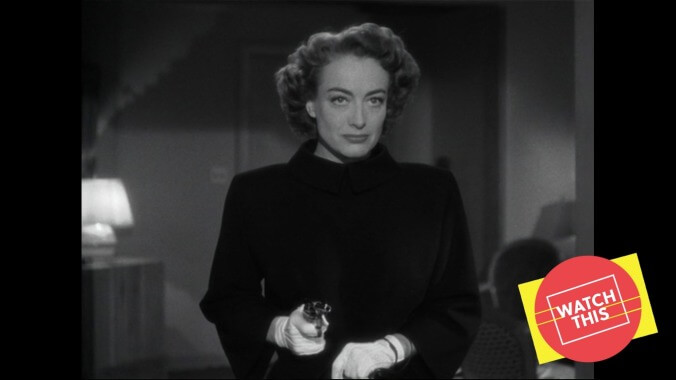Joan Crawford elevated noir into a moving portrait of mental illness

Watch This offers movie recommendations inspired by new releases, premieres, current events, or occasionally just our own inscrutable whims. This week: With the Russell Crowe road-rage thriller Unhinged racing (unwisely) into theaters, we’re looking back on other films that cast movie stars as psychopaths.
Possessed (1947)
Only two years after winning an Oscar for playing Mildred Pierce, one of film’s longest-suffering mothers, Joan Crawford made the movie that should have won her a second. Possessed takes a granular and sympathetic look at the development of mental illness, built around Crawford’s depiction of Louise Howell Graham, whose fatal mistake is falling in love with a man who does not love her the way she loves him.
Crawford was one of the glamour queens of Hollywood’s Golden Age, yet she starts the movie as plain as audiences had ever seen her: no makeup, hair undone, in an ordinary shirtwaist. Louise appears to be in a catatonic state, aimlessly walking the streets. Eventually, she’s picked up by an ambulance, declared to be in a “non-traumatic stupor,” and delivered to the psychiatric ward, where she encounters the progressive Dr. Harvey Willard (Stanley Ridges). With the aid of some medication, Louise tells the doctors of her ill-fated love affair with David (Van Heflin), a charming, piano-playing chemical engineer who doesn’t want to marry her. We don’t see the more familiar, movie star version of Crawford until 13 minutes into the film.
Even then, Crawford is more unguarded and drab than usual. (Although she famously told studio head Jack Warner in 1943, “Joan Crawford never dies in her movies, and she never ever loses her man to anyone,” winning the Oscar for the less glamorous, unlucky-in-love Mildred Pierce may have turned her head a bit.) We only see Louse and David together long enough for them to break up; it’s clear that her colorless life had been transformed by the relationship with the caddish bachelor—and just as clear that her heartfelt demands (“I want a monopoly on you”) are about to make him head for the hills. The more she tries to hang on, the more he tries to break free—yet Crawford manages to imbue this smothering affection with sympathetic vulnerability.
We’re even more on her character’s side when we see just how lackluster her home life really is. Louise is a live-in nurse for a bedridden woman married to wealthy industrialist Dean Graham (Raymond Massey). Unfortunately for Louise, Dean hires David to work on a new project, further stoking her interest in him by keeping him hovering around the periphery of her life, which only worsens as David develops an interest in Dean’s daughter, Carol (Geraldine Brooks). As Louise tells the tragic story, the doctors helpfully interject with comments about her “persecution complex” and “schizoid attachment.” Her lonely life helped plant the seeds for the mental illness that will soon overwhelm her, but the doctors speculate that her “obsession for this man made them grow.” Director Curtis Bernhardt depicts Louise’s increasingly darkening mind with the long shadows and proto-noir lighting of his native German expressionism.
Crawford and Bernhardt visited psychiatric wards across Southern California to research the role, observing patients and talking to doctors. (One family sued the studio after it was revealed that they witnessed electroshock therapy without permission.) Subsequently, Louise’s descent into madness is carefully crafted, step by downward step. The paranoia, the hallucinations, the fixations—Crawford captures them all in Louise, who knows that something terribly wrong is happening to her but is helpless to stop it. It’s the subtlety of her performance that’s chilling; off-kilter glances and a scene where Louise’s bright chatter gradually slips into mania are as unnerving as any expression of the outlandish behaviors associated with mental illness in the mid-century.
What could have been just a straight-up noir ultimately becomes a more complex statement about the causes of psychopathy. Dr. Willard rails against the use of the word “insane,” for example, and fumes over the fact that a child can get a cast for a broken arm but mental illness carries so much stigma. Possessed helped bring some misconceptions about it to light, thanks in part to a role for Crawford that encompassed both villain and victim.
Availability: Possessed is streaming on Amazon Prime, Google Play, iTunes, YouTube, Fandango, Microsoft, DirectTV, and VUDU.